Are you a music student looking for computers with production and editing software installed? Or perhaps you're an up-and-coming podcast host looking for a fully stocked recording studio? Or maybe you just need a vinyl version of your favorite album. If you have a passion for music, UO Libraries has you covered!
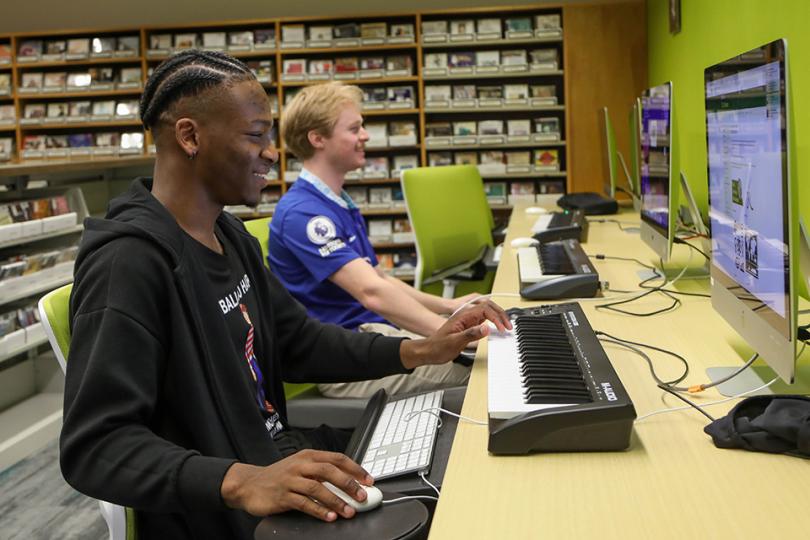
On the northeast side of the third floor in the Knight Library, tucked among the shelves of the music section, you’ll find the Douglass Room. The space in Room 365 is deftly run by Music and Dance Librarian Ann Shaffer who manages the collections along with Manager of Research and Learning Spaces Jimmy Murray, who oversees the space and supervises student employees. Named after Mathew Hale Douglass, head of the University of Oregon Libraries from 1908 to 1942, this space was originally created in the 1990s as a listening room with an audio collection closed to patrons. The Douglass Room reopened in the fall of 2019 as a newly renovated space open to all patrons whenever Knight Library is open. Designed to be what Shaffer describes as “space relevant to how students are working with music now,” this room features:
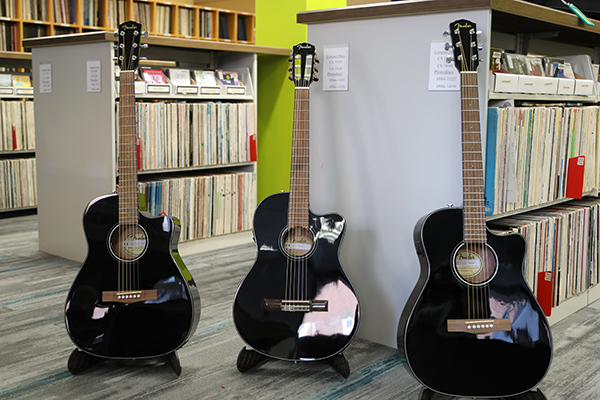
Now available to check out from the Douglass Room—two steel-string electric acoustic guitars and one nylon-string classical guitar. Comfortable furniture and study spaces
- A large collection of recordings in digital, LP record, CD, and cassette formats
- Four listening stations with various equipment
- Five computers with music programs such as Finale, Sibelius, Logic, and Adobe Creative Cloud installed
- One reservable meeting and study space that accommodates up to 21 people
- Two reservable audio production studios
- Equipment such as headphones, external CD/DVD drives, audio adapters, and splitters available for in-room checkout
- And newly available, three guitars—two steel-string electric acoustic and one nylon-string classical—are now available to check out
A Space to Cultivate Creativity
The Douglass Room provides a welcoming space for students and other researchers to pursue both scholarly musical research and creative exploration. This room contains thousands of scores, manuscripts, audio recordings, digital tools, and helpful staff—everything needed to embark on an academic project.
Yet, this room also caters to what Shaffer calls “creative research,” where one “has to be in the practice of music making or dance making in order to conduct one's research and learning.” The Douglass Room provides a great space for this creative and performance-based learning as well, encouraging individuals to settle in on comfortable seating, ‘jam’ on the available guitars, make and explore music, and collaborate with others. The desktop workspaces, audio production studios, and digital and physical music collections make this the perfect room for classwork, research, and musical discovery.
The Douglass Room not only provides its patrons with physical and technological resources but also houses the intellectual expertise of Shaffer and a group of knowledgeable student employees. With her considerable knowledge concerning the library’s musical resources as well as degrees in classical performance and musicology, Shaffer is well suited to answer the questions and meet the research needs of all those entering this space. Having served as the music and dance librarian at the University of Oregon for 13 years, Shaffer says “I love hearing what other musicians are looking for, what they are doing. I love when I can help them find something that they could not otherwise get ahold of.”
Students Work and Play Here
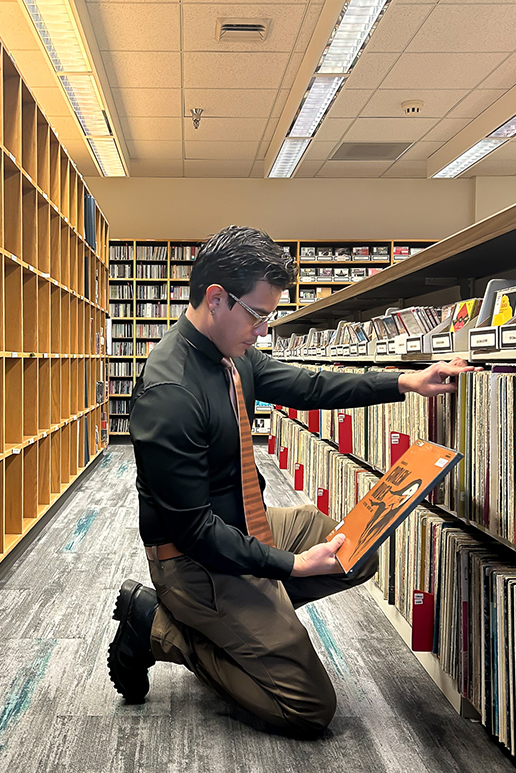
Esteban Zúñiga, a doctoral student from Costa Rica studying Musical Arts with an emphasis in vocal performance, is another friendly face you’ll see staffing the Douglass Room’s Help Desk. Passionate about expanding awareness of the room and its resources to both music students and the general public, Zúñiga shared, “We have a CD collection with anything from Beethoven to Sam Smith, so it’s a matter of people reaching out and seeing what’s available.”
Because the publicity surrounding the redesign of the Douglass Room was interrupted by the pandemic, Zúñiga explained that its progressive re-opening after a year of closure resulted in students discovering the room, using it for a year, and then graduating. He hopes to see the room utilized to its full capacity, saying, “There is lots of natural light, you can charge your phone while sitting on the couch, you can eat here, you can listen to stuff, you have computers to do your homework ... Scores, audio, literature about your field; whatever resource you need, its all here."
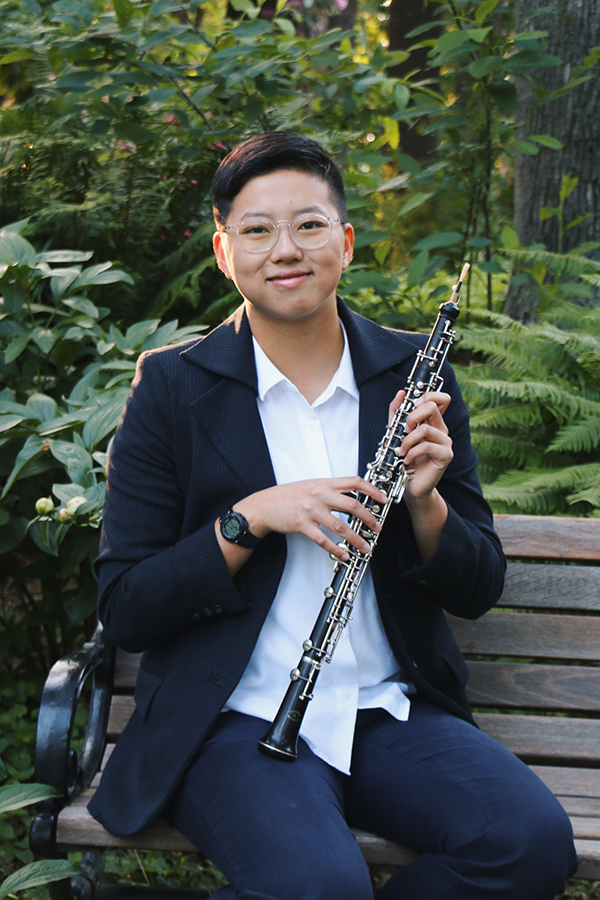
Jamie Diep, ‘23, a current audio journalist with KBBI Radio in Alaska and a former UO Music and Anthropology student with minors in audio production and Chinese, often used the Douglass Room during their time at the UO. They began visiting the room while working to complete their audio production minor, sharing, “I just wanted to find a space that I could use outside of the [School of Music and Dance] where I could work on my projects uninterrupted, and have access to a computer lab with the software I needed.”
Jamie worked on both personal projects as well as class assignments, ranging anywhere “from coding audio plug-ins, to producing [their] own music, to mixing,” often requiring them to checkout audio equipment and access the programs installed on the desktop computers.
Anyone Can Access Special Equipment
Not limited to music students, the Douglass Room and its equipment, studios, and music are accessible to all, which is especially helpful for those who are not enrolled in the School of Music and Dance but need access to this specialized equipment.
Mitch Hughey, a music cataloger in the UO Libraries, is passionate about expanding musical equipment access to groups who typically do not have these resources at their disposal. With the help of funds received from the Richard and Mary Corrigan Solari Library Faculty Incentive Award for their project "Building a Guitar Lending Collection to Support Musical Learning and Recreation on Campus," Hughey and Shaffer have launched a new program where UO students can check out guitar kits containing everything they need to get started playing the guitar or trying a new kind. These kits contain:
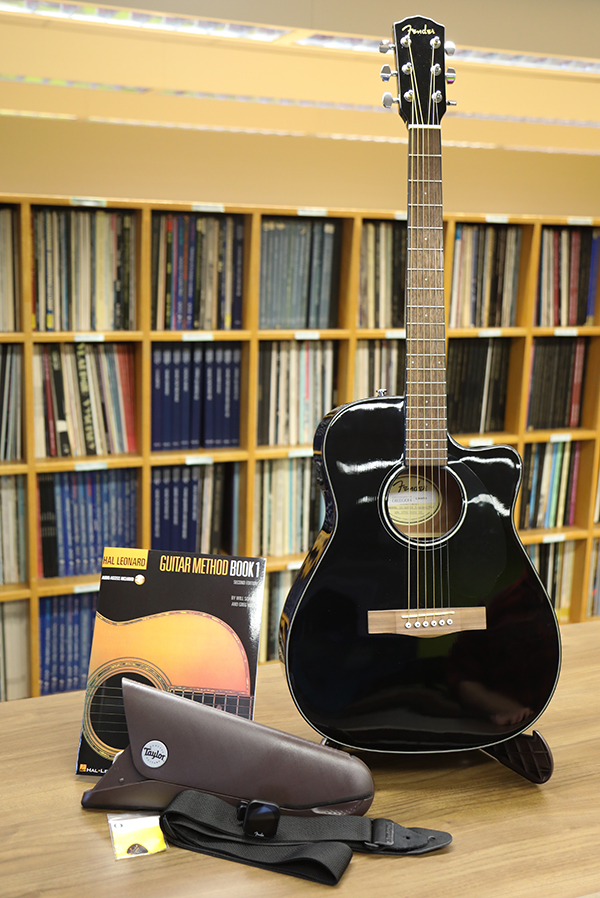
One of three guitar kits are now ready for checking out. 1 nylon string classical guitar or steel string electric acoustic guitar
- Tuner
- Pick
- Beginner’s guitar book
- Stand
- Cleaning cloth
The Douglass Room’s guitar checkout program, as Hughey explained, goes beyond offering “equitable and inclusive access to instruments.” It is part of a larger movement within libraries toward offering a “libraries of things.” Hughey says, “Libraries are offering more physical items that [patrons] cannot access online, trying to introduce shared physical experiences.” This step toward loaning physical objects aims to solve the problem of accessibility. About the guitar checkout program, Hughey said, we’re trying to “lower the barrier of entry and allow people to just try it. ... Hopefully you get bit with the bug and the sky's the limit.”
With resources serving music scholars, beginner musicians, and even those simply looking to find the perfect recording of their favorite song, the Douglass Room strives to be a place breaking these barriers of accessibility, “support[ing] different parts of the UO population at different levels.” Visit the Douglass Room in Knight Library, room 365, chat with Shaffer and student employees, and experience what resources this space has to offer!
—By Myra Bernard (Class of '24, Music and Philosophy), communications assistant, UO Libraries
